Unit8 From Hobby to Career 词汇讲义含答案
文档属性
| 名称 | Unit8 From Hobby to Career 词汇讲义含答案 |
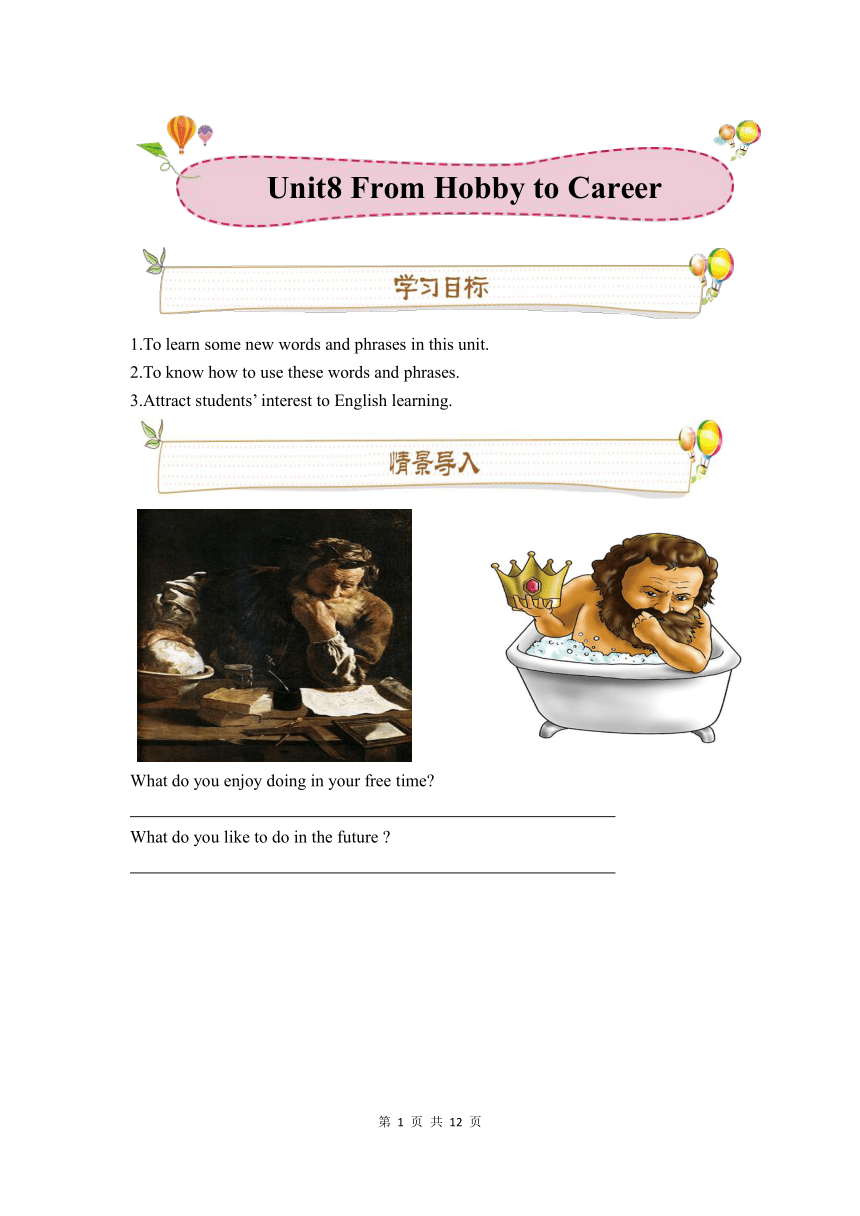
|
|
| 格式 | zip | ||
| 文件大小 | 579.8KB | ||
| 资源类型 | 教案 | ||
| 版本资源 | 牛津深圳版 | ||
| 科目 | 英语 | ||
| 更新时间 | 2021-05-15 00:00:00 | ||
图片预览

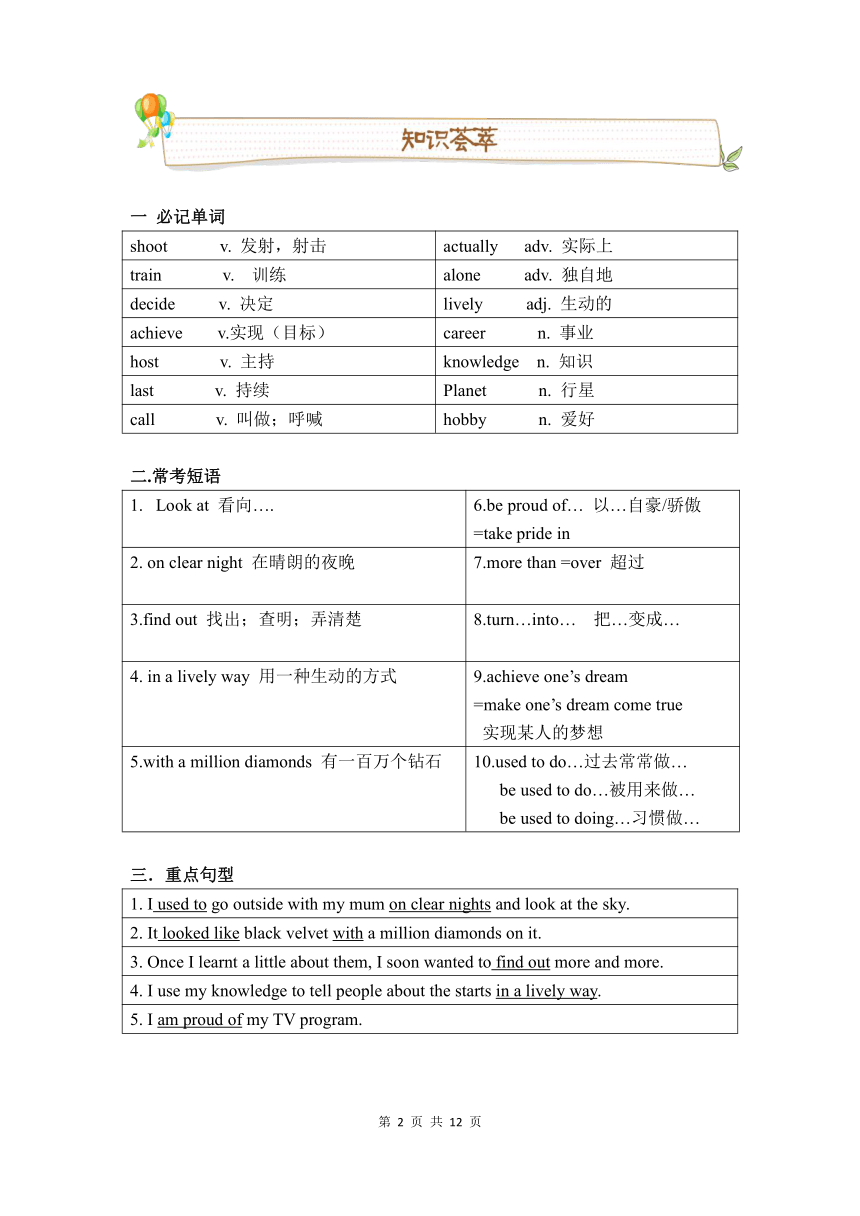
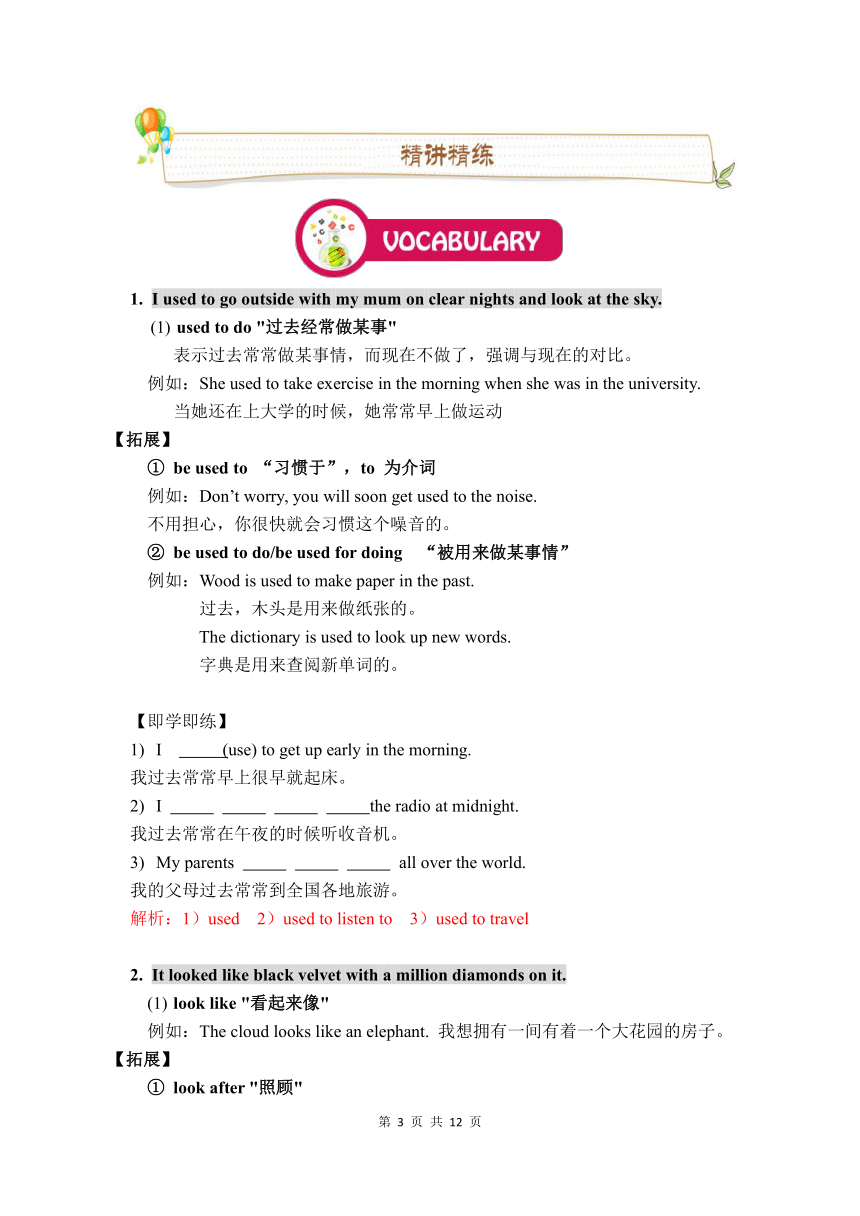
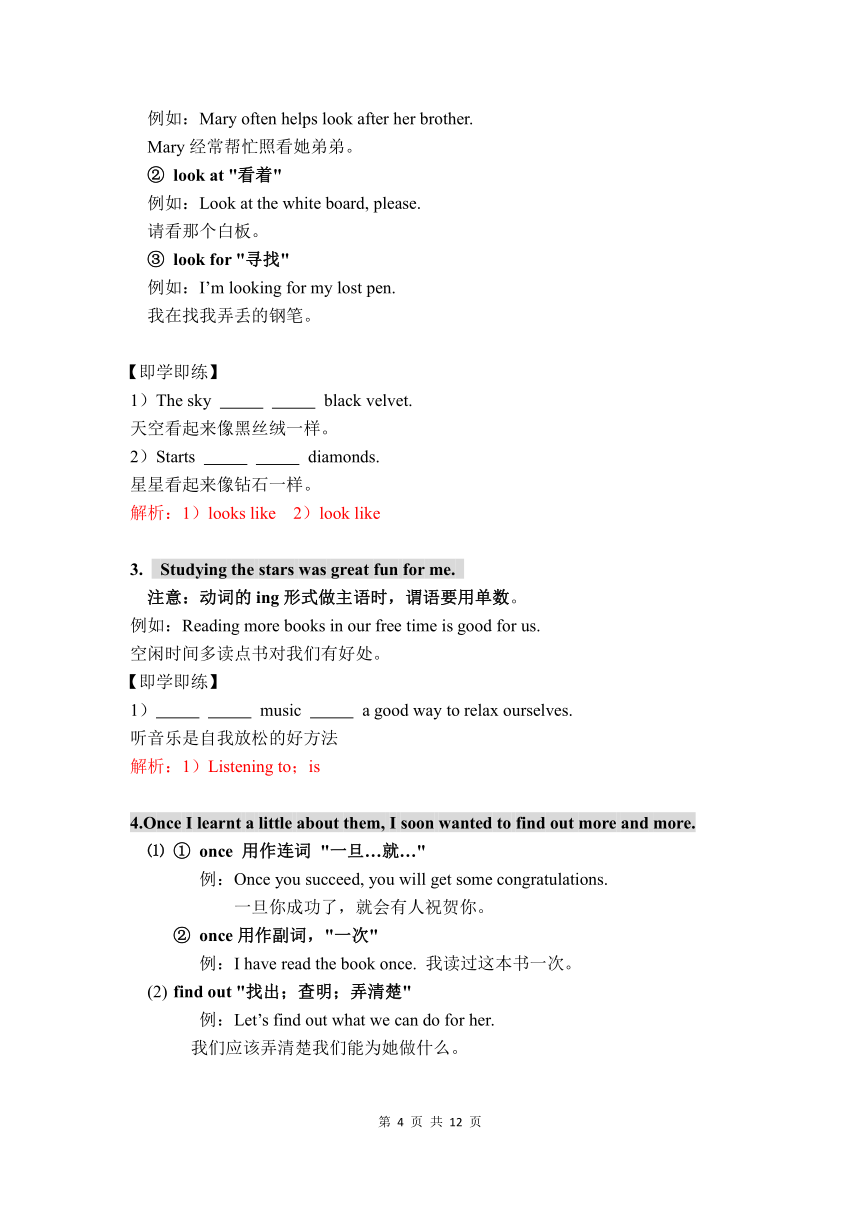
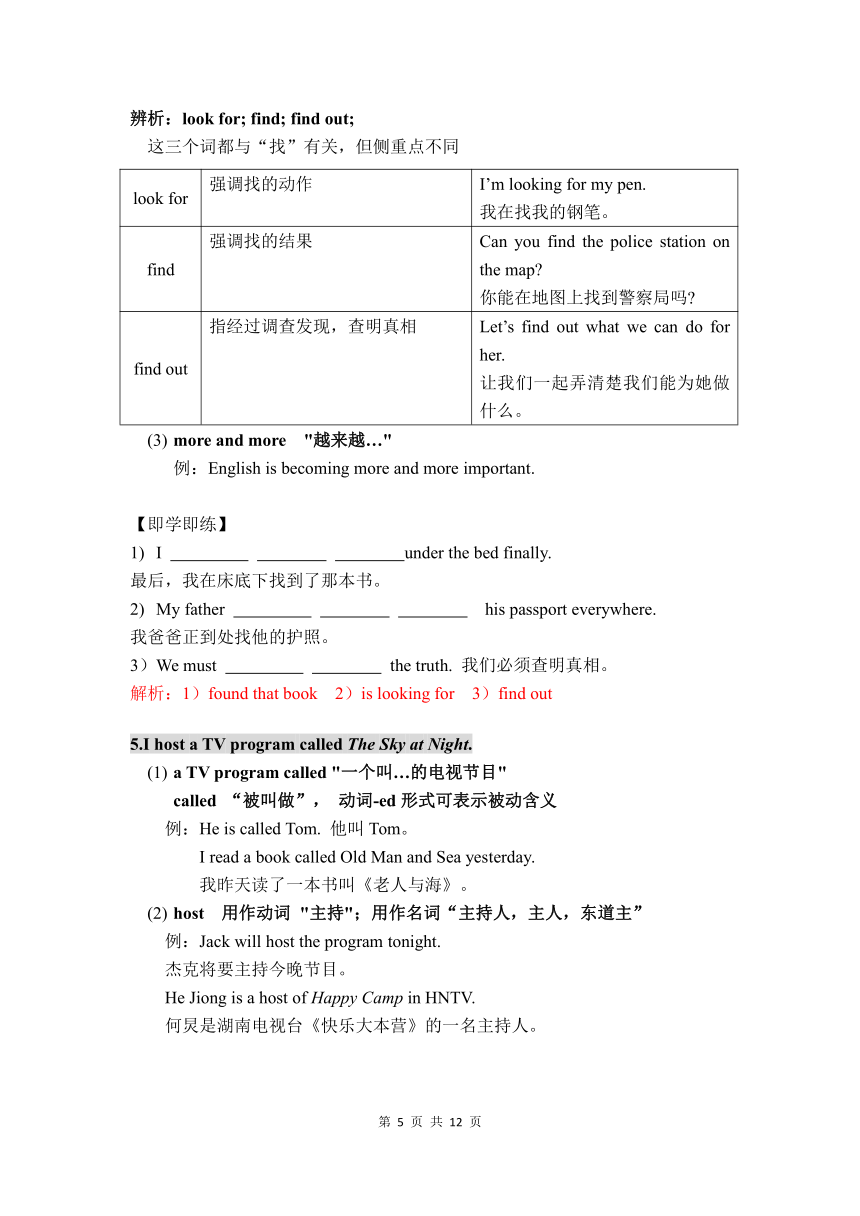
文档简介
To
learn
some
new
words
and
phrases
in
this
unit.
To
know
how
to
use
these
words
and
phrases.
Attract
students’
interest
to
English
learning.
What
do
you
enjoy
doing
in
your
free
time?
What
do
you
like
to
do
in
the
future
?
一
必记单词
shoot
v.
发射,射击
actually
adv.
实际上
train
v.
训练
alone
adv.
独自地
decide
v.
决定
lively
adj.
生动的
achieve
v.实现(目标)
career
n.
事业
host
v.
主持
knowledge
n.
知识
last
v.
持续
Planet
n.
行星
call
v.
叫做;呼喊
hobby
n.
爱好
二.常考短语
Look
at
看向….
6.be
proud
of…
以…自豪/骄傲
=take
pride
in
2.
on
clear
night
在晴朗的夜晚
7.more
than
=over
超过
3.find
out
找出;查明;弄清楚
8.turn…into…
把…变成…
4.
in
a
lively
way
用一种生动的方式
9.achieve
one’s
dream
=make
one’s
dream
come
true
实现某人的梦想
5.with
a
million
diamonds
有一百万个钻石
10.used
to
do…过去常常做…
be
used
to
do…被用来做…
be
used
to
doing…习惯做…
三.重点句型
1.
I
used
to
go
outside
with
my
mum
on
clear
nights
and
look
at
the
sky.
2.
It
looked
like
black
velvet
with
a
million
diamonds
on
it.
3.
Once
I
learnt
a
little
about
them,
I
soon
wanted
to
find
out
more
and
more.
4.
I
use
my
knowledge
to
tell
people
about
the
starts
in
a
lively
way.
5.
I
am
proud
of
my
TV
program.
I
used
to
go
outside
with
my
mum
on
clear
nights
and
look
at
the
sky.
used
to
do
"过去经常做某事"
表示过去常常做某事情,而现在不做了,强调与现在的对比。
例如:She
used
to
take
exercise
in
the
morning
when
she
was
in
the
university.
当她还在上大学的时候,她常常早上做运动
【拓展】
①
be
used
to
“习惯于”,to
为介词
例如:Don’t
worry,
you
will
soon
get
used
to
the
noise.
不用担心,你很快就会习惯这个噪音的。
②
be
used
to
do/be
used
for
doing
“被用来做某事情”
例如:Wood
is
used
to
make
paper
in
the
past.
过去,木头是用来做纸张的。
The
dictionary
is
used
to
look
up
new
words.
字典是用来查阅新单词的。
【即学即练】
I
(use)
to
get
up
early
in
the
morning.
我过去常常早上很早就起床。
I
the
radio
at
midnight.
我过去常常在午夜的时候听收音机。
My
parents
all
over
the
world.
我的父母过去常常到全国各地旅游。
解析:1)used
2)used
to
listen
to
3)used
to
travel
It
looked
like
black
velvet
with
a
million
diamonds
on
it.
look
like
"看起来像"
例如:The
cloud
looks
like
an
elephant.
我想拥有一间有着一个大花园的房子。
【拓展】
①
look
after
"照顾"
例如:Mary
often
helps
look
after
her
brother.
Mary经常帮忙照看她弟弟。
②
look
at
"看着"
例如:Look
at
the
white
board,
please.
请看那个白板。
③
look
for
"寻找"
例如:I’m
looking
for
my
lost
pen.
我在找我弄丢的钢笔。
【即学即练】
1)The
sky
black
velvet.
天空看起来像黑丝绒一样。
2)Starts
diamonds.
星星看起来像钻石一样。
解析:1)looks
like
2)look
like
Studying
the
stars
was
great
fun
for
me.
注意:动词的ing形式做主语时,谓语要用单数。
例如:Reading
more
books
in
our
free
time
is
good
for
us.
空闲时间多读点书对我们有好处。
【即学即练】
1)
music
a
good
way
to
relax
ourselves.
听音乐是自我放松的好方法
解析:1)Listening
to;is
4.Once
I
learnt
a
little
about
them,
I
soon
wanted
to
find
out
more
and
more.
⑴
①
once
用作连词
"一旦…就…"
例:Once
you
succeed,
you
will
get
some
congratulations.
一旦你成功了,就会有人祝贺你。
②
once用作副词,"一次"
例:I
have
read
the
book
once.
我读过这本书一次。
find
out
"找出;查明;弄清楚"
例:Let’s
find
out
what
we
can
do
for
her.
我们应该弄清楚我们能为她做什么。
辨析:look
for;
find;
find
out;
这三个词都与“找”有关,但侧重点不同
look
for
强调找的动作
I’m
looking
for
my
pen.
我在找我的钢笔。
find
强调找的结果
Can
you
find
the
police
station
on
the
map?
你能在地图上找到警察局吗?
find
out
指经过调查发现,查明真相
Let’s
find
out
what
we
can
do
for
her.
让我们一起弄清楚我们能为她做什么。
more
and
more
"越来越…"
例:English
is
becoming
more
and
more
important.
【即学即练】
I
under
the
bed
finally.
最后,我在床底下找到了那本书。
My
father
his
passport
everywhere.
我爸爸正到处找他的护照。
3)We
must
the
truth.
我们必须查明真相。
解析:1)found
that
book
2)is
looking
for
3)find
out
5.I
host
a
TV
program
called
The
Sky
at
Night.
a
TV
program
called
"一个叫…的电视节目"
called
“被叫做”,
动词-ed形式可表示被动含义
例:He
is
called
Tom.
他叫Tom。
I
read
a
book
called
Old
Man
and
Sea
yesterday.
我昨天读了一本书叫《老人与海》。
host
用作动词
"主持";用作名词“主持人,主人,东道主”
例:Jack
will
host
the
program
tonight.
杰克将要主持今晚节目。
He
Jiong
is
a
host
of
Happy
Camp
in
HNTV.
何炅是湖南电视台《快乐大本营》的一名主持人。
【即学即练】
1)Li
Ming
wants
to
be
when
he
grows
up.
李明长大想做一名主持人。
2)Lucy
the
New
Year
Party
tomorrow.
露西明天将要主持新年晚会。
3)I
have
a
friend
(call)
Tim.
我有个叫Tim的朋友。
解析:1)a
host
2)will
host
3)called
6.I
use
my
knowledge
to
tell
people
about
the
stars
in
a
lively
way.
use
sth.
to
do
sth.
"用某物做某事"
例:You
can
use
knives
to
cut
things.
你可以用刀切东西。
knowledge
不可数名词
"知识"
例:We
should
use
knowledge
to
solve
the
problems.
我们应该用知识来解决问题。
(3)lively
形容词
"生动的"
in
a
lively
way
用一种生动的方式
in
a
way
在某种程度上
in
an
interesting
way
用一种有趣的方式
例:He
made
the
liveliest
speech
in
class.
他在课上做了一次最生动的演讲。
【即学即练】
We
can
use
dictionary
(look
up)
new
words.
我们可以用字典查新单词。
2)She
was
very
at
the
stage.
她在舞台上非常活跃。
3)
plays
an
important
role
in
our
daily
life.
知识在我们日常生活中扮演着重要的角色。
解析:1)to
look
up
2)lively
3)Knowledge
7.
I
am
proud
of
my
TV
program.
be
proud
of
"以…自豪/骄傲"=take
pride
in
例:His
father
is
proud
of
him.
他爸爸以他为自豪。
【即学即练】
Dear
classmates,
all
of
you
are
so
excellent
that
I
am
of
you.
A.
proud
B.
pride
C.
great
D.
well
解析:C
be
proud
of
"以…自豪/骄傲"=take
pride
in
8.Actually,
you
can
turn
your
hobby
into
your
career,
too.
Turn…into…
"把…变成…"
例:turn
water
into
ice.
把水变成冰。
【即学即练】
将这个句子译成英文。
2)如果你努力学习,你就能把知识变成金钱。
解析:1)
Turn
this
sentence
into
English.
2)
If
you
study
hard,
you
can
turn
knowledge
into
money.
9.
anybody
can
achieve
their
dreams.
achieve
用作动词
"实现"(achieve,
achieving,
achieved,
achieved)
例:You
must
work
hard
to
achieve
all
your
goals.
你必须努力实现你所有的目标。
achieve
one’s
dream
"实现某人的梦想"
=make
one’s
dream
come
true
例:You
should
try
your
best
to
achieve
your
dream.
你应该尽你最大的努力去实现你的梦想。
achievement
用作名词
"实现"
例:He
graduated
with
excellent
achievement.
他以优异的成绩毕业。
综合练习
英汉互译。
1.事业
2.
turn…into…
3.
in
a
lively
way
4.
find
out
5.
achieve
one’s
dream
6.
知识
7.决定
8.
训练
二、词形转换(用所给单词的适当形式填空)
(actual),
your
answer
is
completely
correct.
His
rich
(know)
about
the
universe
helped
him
get
the
job.
After
working
hard
for
several
years,
he
finally
(achieve)his
dream.
What
is
your
final
(decide)?
We
(use)
to
play
basketball
after
school,
but
we
don’t
have
any
time
for
it
now.
三、翻译句子
每堂课持续
45
分钟。
.
为了达到目标,我们必须从现在开始努力工作。
.
我决定在将来当一个著名的歌手。
.
我们必须要学习更多的知识。
.
他曾经在这个村庄里生活了
20
年。
.
解析:
一、
career
2.把...变成…
3.用一种生动的方式
4.找出;查明;弄清楚
5.实现某人的梦想
6.knowledge
7.decide
8.
train
二、
1.Actually
2.
knowledge
3.
Achieved
4.
decision
5.
used
三.
1.
Each
class
lasts
45
minutes.
2.
In
order
to
achieve
our
goal,
we
must
work
hard
from
now
on.
3.
I
decide
to
become
a
famous
singer
in
future.
4.
We
must
learn
more
knowledge.
5.
He
once
lived
20
years
in
this
village.
单项选择
1.
---The
computer
is
good
and
it’s
only
2,000
yuan.
---That’s
too
much
for
me!
A.
expensive
B.
cheap
C.
tall
2.
---How
often
do
you
water
the
plants?
---Twice
a
week.
A.
One
time
B.
Two
times
C.
Three
times
3.
---How
big
is
his
family?
---There
are
five
members
in
all.
A.
boys
B.
women
C.
people
4.
---What
is
the
weather
like
today?
---It’s
not
so
hot
as
yesterday.
A.
cooler
than
B.
hotter
than
C.
the
same
as
5.
---How
do
you
usually
communicate
with
your
parents?
---I
seldom
write
letters.
I
usually
send
them
messages
and
emails.
A.
normally
B.
hardly
C.
usually
6.
Jack
started
to
work
at
an
early
age
because
his
family
was
very
.
A.
happy
B.
rich
C.
poor
7.
The
next
class
meeting
will
be
_________
in
two
days.
Please
be
prepared.
A.
held
B.
put
off
C.
canceled
8.
To
my
_________
,
everyone
passed
the
difficult
English
test
yesterday.
A.
dream
B.
surprise
C.
happiness
9.
Although
hamburgers
are
junk
food,
many
children
_________
love
them.
A.
sometimes
B.
always
C.
still
10.
His
old
_________
is
two
minutes
slow.
A.
watch
B.
book
C.
radio
二、练习:在下列各句的空格中填入适当的连词
1._________
he
comes
tomorrow,
I
shall
ask
where
he
has
been.
2._________
he
was
speaking,
everybody
listened
carefully.
3.I
saw
her
just
_________
she
was
getting
off
the
train.
4.Have
a
good
look
at
that
man
_________
you
pass
him.
5.It
was
already
eight
o'clock
_________
we
got
there.
6.
I
was
about
to
go
out
_________
a
visitor
came.
7.We'll
go
to
the
country
at
the
beginning
of
June,
______
the
summer
harvest
will
start.
8.
He
learned
to
speak
German
_________
he
was
in
Berlin.
9.
Henry
is
in
charge
of
the
office
________
Mr.
Smith
is
away.
10.
I
listen
to
the
recorder
_________
I
have
time.
11.
He
had
learned
Chinese
_________
he
came
to
China.
12.
_________
the
work
was
done,
we
sat
down
to
sum
up
experience.
13.
I
haven't
seen
him
_________
he
moved
to
the
other
side
of
the
town.
14.
I
waited
________
he
came
back.
15.
It
was
not
________
he
took
off
his
eyeglasses
that
I
recognized
him.
16.
She
likes
everything
to
be
in
place
________
she
starts
to
work.
17.
The
thieves
ran
away
_________
they
caught
sight
of
the
police.
18.
They
decided
to
go
back
home
_________
their
money
ran
out.
19.
We
played
outside
till
sunset,
_________
it
began
to
rain。
20.
__________
I
get
to
the
airport,
I
will
phone
you
to
pick
me
up.
21.
They
were
about
to
leave
______
it
began
to
rain.
22.
He
always
stay
in
bed
______
lunch
time.
23.
I
like
playing
tennis
_________
my
younger
sister
prefers
watching
ball
games.
24.
_________
I
understand
your
viewpoint,
I
don’t
agree
with
you.
25.
_______
she
grew
older,
she
became
more
responsible.
解析:一1-5ABCAB
6-10
CABCA
二.
1.
When 2.
While
/
When
3.
as
4.
when/as 5.
when
6.
when
7.
when
8.
while 9.
while
10.
whenever 11.
before
12.
After 13.
since
14.
till/until 15.
until
16.
before 17.
as
soon
as
18.
before 19.
when 20.
As
soon
as 21.when
22.
until
23.
while 24.
While
25.
As
必记单词
shoot
v.
发射,射击
actually
adv.
实际上
train
v.
训练
alone
adv.
独自地
decide
v.
决定
lively
adj.
生动的
achieve
v.实现(目标)
career
n.
事业
host
v.
主持
knowledge
n.
知识
二.常考短语
1.Look
at
看向….
6.be
proud
of…
以…自豪/骄傲
=take
pride
in
2.
on
clear
night
在晴朗的夜晚
7.more
than
=over
超过
3.find
out
找出;查明;弄清楚
8.turn…into…
把…变成…
4.
in
a
lively
way
用一种生动的方式
9.achieve
one’s
dream
=make
one’s
dream
come
true
实现某人的梦想
5.with
a
million
diamonds
有一百万个钻石
10.used
to
do…过去常常做…
be
used
to
do…被用来做…
be
used
to
doing…习惯做…
学生易错点整理:
———————————————————————————————————————————————————————————————————————————————————————————————————————————————————————————————————————
learn
some
new
words
and
phrases
in
this
unit.
To
know
how
to
use
these
words
and
phrases.
Attract
students’
interest
to
English
learning.
What
do
you
enjoy
doing
in
your
free
time?
What
do
you
like
to
do
in
the
future
?
一
必记单词
shoot
v.
发射,射击
actually
adv.
实际上
train
v.
训练
alone
adv.
独自地
decide
v.
决定
lively
adj.
生动的
achieve
v.实现(目标)
career
n.
事业
host
v.
主持
knowledge
n.
知识
last
v.
持续
Planet
n.
行星
call
v.
叫做;呼喊
hobby
n.
爱好
二.常考短语
Look
at
看向….
6.be
proud
of…
以…自豪/骄傲
=take
pride
in
2.
on
clear
night
在晴朗的夜晚
7.more
than
=over
超过
3.find
out
找出;查明;弄清楚
8.turn…into…
把…变成…
4.
in
a
lively
way
用一种生动的方式
9.achieve
one’s
dream
=make
one’s
dream
come
true
实现某人的梦想
5.with
a
million
diamonds
有一百万个钻石
10.used
to
do…过去常常做…
be
used
to
do…被用来做…
be
used
to
doing…习惯做…
三.重点句型
1.
I
used
to
go
outside
with
my
mum
on
clear
nights
and
look
at
the
sky.
2.
It
looked
like
black
velvet
with
a
million
diamonds
on
it.
3.
Once
I
learnt
a
little
about
them,
I
soon
wanted
to
find
out
more
and
more.
4.
I
use
my
knowledge
to
tell
people
about
the
starts
in
a
lively
way.
5.
I
am
proud
of
my
TV
program.
I
used
to
go
outside
with
my
mum
on
clear
nights
and
look
at
the
sky.
used
to
do
"过去经常做某事"
表示过去常常做某事情,而现在不做了,强调与现在的对比。
例如:She
used
to
take
exercise
in
the
morning
when
she
was
in
the
university.
当她还在上大学的时候,她常常早上做运动
【拓展】
①
be
used
to
“习惯于”,to
为介词
例如:Don’t
worry,
you
will
soon
get
used
to
the
noise.
不用担心,你很快就会习惯这个噪音的。
②
be
used
to
do/be
used
for
doing
“被用来做某事情”
例如:Wood
is
used
to
make
paper
in
the
past.
过去,木头是用来做纸张的。
The
dictionary
is
used
to
look
up
new
words.
字典是用来查阅新单词的。
【即学即练】
I
(use)
to
get
up
early
in
the
morning.
我过去常常早上很早就起床。
I
the
radio
at
midnight.
我过去常常在午夜的时候听收音机。
My
parents
all
over
the
world.
我的父母过去常常到全国各地旅游。
解析:1)used
2)used
to
listen
to
3)used
to
travel
It
looked
like
black
velvet
with
a
million
diamonds
on
it.
look
like
"看起来像"
例如:The
cloud
looks
like
an
elephant.
我想拥有一间有着一个大花园的房子。
【拓展】
①
look
after
"照顾"
例如:Mary
often
helps
look
after
her
brother.
Mary经常帮忙照看她弟弟。
②
look
at
"看着"
例如:Look
at
the
white
board,
please.
请看那个白板。
③
look
for
"寻找"
例如:I’m
looking
for
my
lost
pen.
我在找我弄丢的钢笔。
【即学即练】
1)The
sky
black
velvet.
天空看起来像黑丝绒一样。
2)Starts
diamonds.
星星看起来像钻石一样。
解析:1)looks
like
2)look
like
Studying
the
stars
was
great
fun
for
me.
注意:动词的ing形式做主语时,谓语要用单数。
例如:Reading
more
books
in
our
free
time
is
good
for
us.
空闲时间多读点书对我们有好处。
【即学即练】
1)
music
a
good
way
to
relax
ourselves.
听音乐是自我放松的好方法
解析:1)Listening
to;is
4.Once
I
learnt
a
little
about
them,
I
soon
wanted
to
find
out
more
and
more.
⑴
①
once
用作连词
"一旦…就…"
例:Once
you
succeed,
you
will
get
some
congratulations.
一旦你成功了,就会有人祝贺你。
②
once用作副词,"一次"
例:I
have
read
the
book
once.
我读过这本书一次。
find
out
"找出;查明;弄清楚"
例:Let’s
find
out
what
we
can
do
for
her.
我们应该弄清楚我们能为她做什么。
辨析:look
for;
find;
find
out;
这三个词都与“找”有关,但侧重点不同
look
for
强调找的动作
I’m
looking
for
my
pen.
我在找我的钢笔。
find
强调找的结果
Can
you
find
the
police
station
on
the
map?
你能在地图上找到警察局吗?
find
out
指经过调查发现,查明真相
Let’s
find
out
what
we
can
do
for
her.
让我们一起弄清楚我们能为她做什么。
more
and
more
"越来越…"
例:English
is
becoming
more
and
more
important.
【即学即练】
I
under
the
bed
finally.
最后,我在床底下找到了那本书。
My
father
his
passport
everywhere.
我爸爸正到处找他的护照。
3)We
must
the
truth.
我们必须查明真相。
解析:1)found
that
book
2)is
looking
for
3)find
out
5.I
host
a
TV
program
called
The
Sky
at
Night.
a
TV
program
called
"一个叫…的电视节目"
called
“被叫做”,
动词-ed形式可表示被动含义
例:He
is
called
Tom.
他叫Tom。
I
read
a
book
called
Old
Man
and
Sea
yesterday.
我昨天读了一本书叫《老人与海》。
host
用作动词
"主持";用作名词“主持人,主人,东道主”
例:Jack
will
host
the
program
tonight.
杰克将要主持今晚节目。
He
Jiong
is
a
host
of
Happy
Camp
in
HNTV.
何炅是湖南电视台《快乐大本营》的一名主持人。
【即学即练】
1)Li
Ming
wants
to
be
when
he
grows
up.
李明长大想做一名主持人。
2)Lucy
the
New
Year
Party
tomorrow.
露西明天将要主持新年晚会。
3)I
have
a
friend
(call)
Tim.
我有个叫Tim的朋友。
解析:1)a
host
2)will
host
3)called
6.I
use
my
knowledge
to
tell
people
about
the
stars
in
a
lively
way.
use
sth.
to
do
sth.
"用某物做某事"
例:You
can
use
knives
to
cut
things.
你可以用刀切东西。
knowledge
不可数名词
"知识"
例:We
should
use
knowledge
to
solve
the
problems.
我们应该用知识来解决问题。
(3)lively
形容词
"生动的"
in
a
lively
way
用一种生动的方式
in
a
way
在某种程度上
in
an
interesting
way
用一种有趣的方式
例:He
made
the
liveliest
speech
in
class.
他在课上做了一次最生动的演讲。
【即学即练】
We
can
use
dictionary
(look
up)
new
words.
我们可以用字典查新单词。
2)She
was
very
at
the
stage.
她在舞台上非常活跃。
3)
plays
an
important
role
in
our
daily
life.
知识在我们日常生活中扮演着重要的角色。
解析:1)to
look
up
2)lively
3)Knowledge
7.
I
am
proud
of
my
TV
program.
be
proud
of
"以…自豪/骄傲"=take
pride
in
例:His
father
is
proud
of
him.
他爸爸以他为自豪。
【即学即练】
Dear
classmates,
all
of
you
are
so
excellent
that
I
am
of
you.
A.
proud
B.
pride
C.
great
D.
well
解析:C
be
proud
of
"以…自豪/骄傲"=take
pride
in
8.Actually,
you
can
turn
your
hobby
into
your
career,
too.
Turn…into…
"把…变成…"
例:turn
water
into
ice.
把水变成冰。
【即学即练】
将这个句子译成英文。
2)如果你努力学习,你就能把知识变成金钱。
解析:1)
Turn
this
sentence
into
English.
2)
If
you
study
hard,
you
can
turn
knowledge
into
money.
9.
anybody
can
achieve
their
dreams.
achieve
用作动词
"实现"(achieve,
achieving,
achieved,
achieved)
例:You
must
work
hard
to
achieve
all
your
goals.
你必须努力实现你所有的目标。
achieve
one’s
dream
"实现某人的梦想"
=make
one’s
dream
come
true
例:You
should
try
your
best
to
achieve
your
dream.
你应该尽你最大的努力去实现你的梦想。
achievement
用作名词
"实现"
例:He
graduated
with
excellent
achievement.
他以优异的成绩毕业。
综合练习
英汉互译。
1.事业
2.
turn…into…
3.
in
a
lively
way
4.
find
out
5.
achieve
one’s
dream
6.
知识
7.决定
8.
训练
二、词形转换(用所给单词的适当形式填空)
(actual),
your
answer
is
completely
correct.
His
rich
(know)
about
the
universe
helped
him
get
the
job.
After
working
hard
for
several
years,
he
finally
(achieve)his
dream.
What
is
your
final
(decide)?
We
(use)
to
play
basketball
after
school,
but
we
don’t
have
any
time
for
it
now.
三、翻译句子
每堂课持续
45
分钟。
.
为了达到目标,我们必须从现在开始努力工作。
.
我决定在将来当一个著名的歌手。
.
我们必须要学习更多的知识。
.
他曾经在这个村庄里生活了
20
年。
.
解析:
一、
career
2.把...变成…
3.用一种生动的方式
4.找出;查明;弄清楚
5.实现某人的梦想
6.knowledge
7.decide
8.
train
二、
1.Actually
2.
knowledge
3.
Achieved
4.
decision
5.
used
三.
1.
Each
class
lasts
45
minutes.
2.
In
order
to
achieve
our
goal,
we
must
work
hard
from
now
on.
3.
I
decide
to
become
a
famous
singer
in
future.
4.
We
must
learn
more
knowledge.
5.
He
once
lived
20
years
in
this
village.
单项选择
1.
---The
computer
is
good
and
it’s
only
2,000
yuan.
---That’s
too
much
for
me!
A.
expensive
B.
cheap
C.
tall
2.
---How
often
do
you
water
the
plants?
---Twice
a
week.
A.
One
time
B.
Two
times
C.
Three
times
3.
---How
big
is
his
family?
---There
are
five
members
in
all.
A.
boys
B.
women
C.
people
4.
---What
is
the
weather
like
today?
---It’s
not
so
hot
as
yesterday.
A.
cooler
than
B.
hotter
than
C.
the
same
as
5.
---How
do
you
usually
communicate
with
your
parents?
---I
seldom
write
letters.
I
usually
send
them
messages
and
emails.
A.
normally
B.
hardly
C.
usually
6.
Jack
started
to
work
at
an
early
age
because
his
family
was
very
.
A.
happy
B.
rich
C.
poor
7.
The
next
class
meeting
will
be
_________
in
two
days.
Please
be
prepared.
A.
held
B.
put
off
C.
canceled
8.
To
my
_________
,
everyone
passed
the
difficult
English
test
yesterday.
A.
dream
B.
surprise
C.
happiness
9.
Although
hamburgers
are
junk
food,
many
children
_________
love
them.
A.
sometimes
B.
always
C.
still
10.
His
old
_________
is
two
minutes
slow.
A.
watch
B.
book
C.
radio
二、练习:在下列各句的空格中填入适当的连词
1._________
he
comes
tomorrow,
I
shall
ask
where
he
has
been.
2._________
he
was
speaking,
everybody
listened
carefully.
3.I
saw
her
just
_________
she
was
getting
off
the
train.
4.Have
a
good
look
at
that
man
_________
you
pass
him.
5.It
was
already
eight
o'clock
_________
we
got
there.
6.
I
was
about
to
go
out
_________
a
visitor
came.
7.We'll
go
to
the
country
at
the
beginning
of
June,
______
the
summer
harvest
will
start.
8.
He
learned
to
speak
German
_________
he
was
in
Berlin.
9.
Henry
is
in
charge
of
the
office
________
Mr.
Smith
is
away.
10.
I
listen
to
the
recorder
_________
I
have
time.
11.
He
had
learned
Chinese
_________
he
came
to
China.
12.
_________
the
work
was
done,
we
sat
down
to
sum
up
experience.
13.
I
haven't
seen
him
_________
he
moved
to
the
other
side
of
the
town.
14.
I
waited
________
he
came
back.
15.
It
was
not
________
he
took
off
his
eyeglasses
that
I
recognized
him.
16.
She
likes
everything
to
be
in
place
________
she
starts
to
work.
17.
The
thieves
ran
away
_________
they
caught
sight
of
the
police.
18.
They
decided
to
go
back
home
_________
their
money
ran
out.
19.
We
played
outside
till
sunset,
_________
it
began
to
rain。
20.
__________
I
get
to
the
airport,
I
will
phone
you
to
pick
me
up.
21.
They
were
about
to
leave
______
it
began
to
rain.
22.
He
always
stay
in
bed
______
lunch
time.
23.
I
like
playing
tennis
_________
my
younger
sister
prefers
watching
ball
games.
24.
_________
I
understand
your
viewpoint,
I
don’t
agree
with
you.
25.
_______
she
grew
older,
she
became
more
responsible.
解析:一1-5ABCAB
6-10
CABCA
二.
1.
When 2.
While
/
When
3.
as
4.
when/as 5.
when
6.
when
7.
when
8.
while 9.
while
10.
whenever 11.
before
12.
After 13.
since
14.
till/until 15.
until
16.
before 17.
as
soon
as
18.
before 19.
when 20.
As
soon
as 21.when
22.
until
23.
while 24.
While
25.
As
必记单词
shoot
v.
发射,射击
actually
adv.
实际上
train
v.
训练
alone
adv.
独自地
decide
v.
决定
lively
adj.
生动的
achieve
v.实现(目标)
career
n.
事业
host
v.
主持
knowledge
n.
知识
二.常考短语
1.Look
at
看向….
6.be
proud
of…
以…自豪/骄傲
=take
pride
in
2.
on
clear
night
在晴朗的夜晚
7.more
than
=over
超过
3.find
out
找出;查明;弄清楚
8.turn…into…
把…变成…
4.
in
a
lively
way
用一种生动的方式
9.achieve
one’s
dream
=make
one’s
dream
come
true
实现某人的梦想
5.with
a
million
diamonds
有一百万个钻石
10.used
to
do…过去常常做…
be
used
to
do…被用来做…
be
used
to
doing…习惯做…
学生易错点整理:
———————————————————————————————————————————————————————————————————————————————————————————————————————————————————————————————————————
